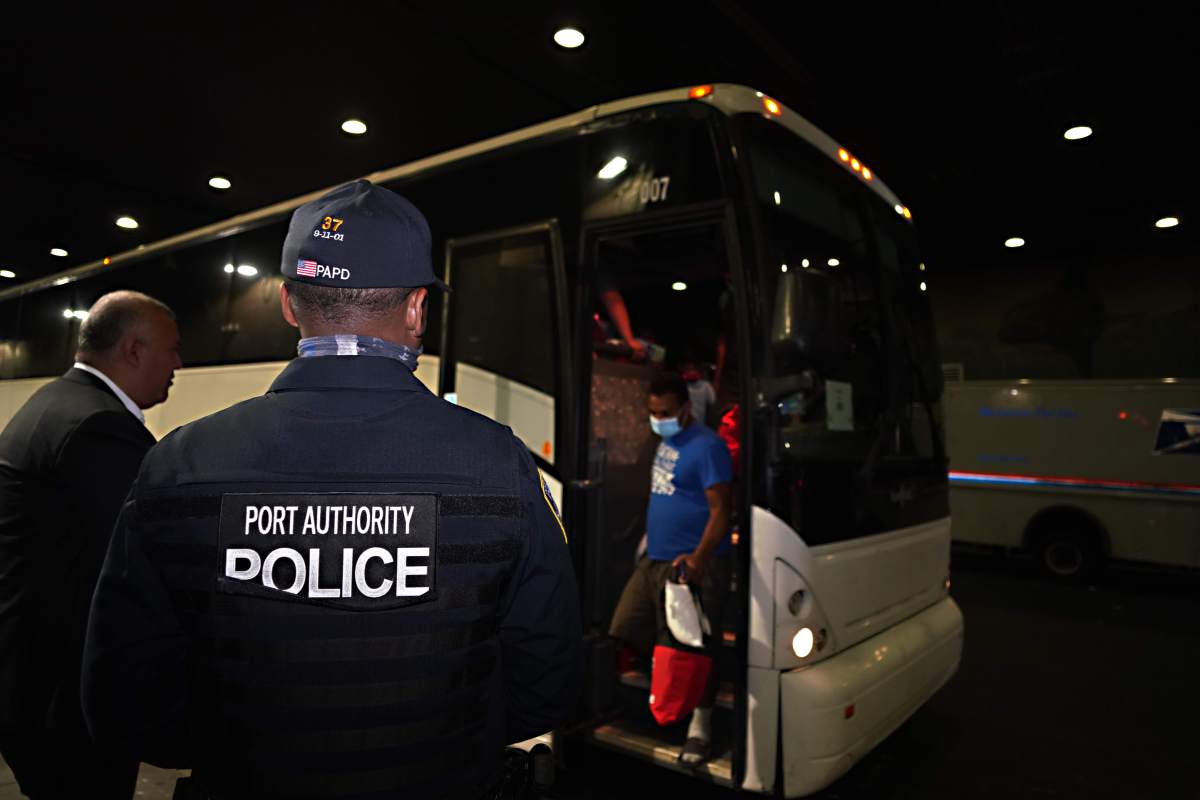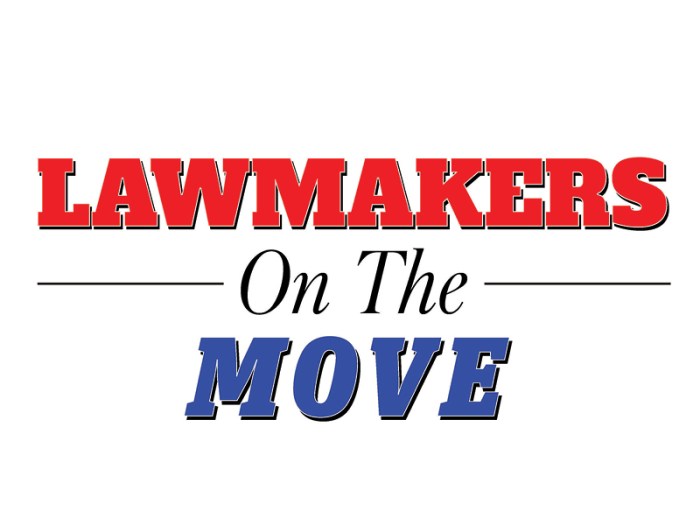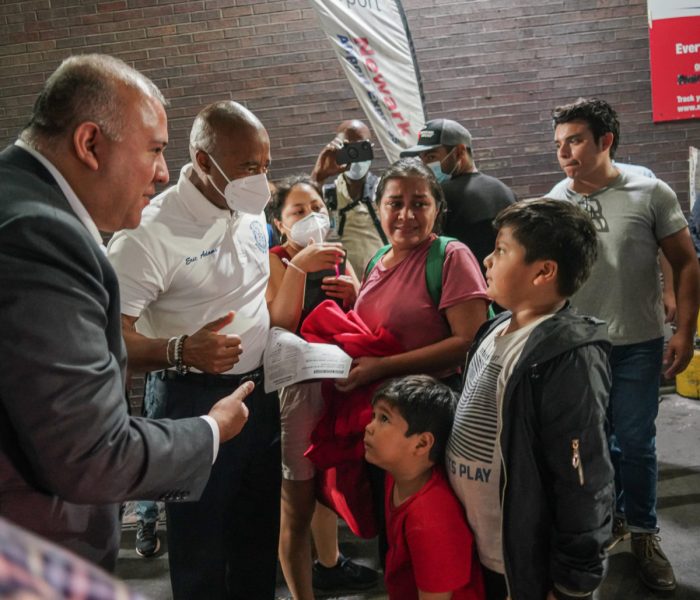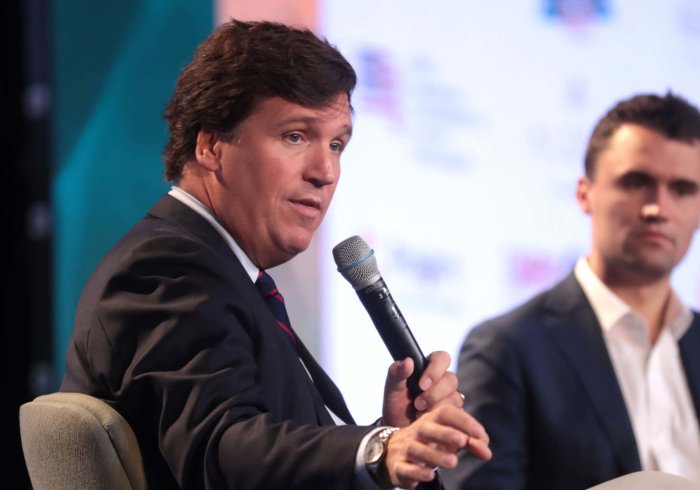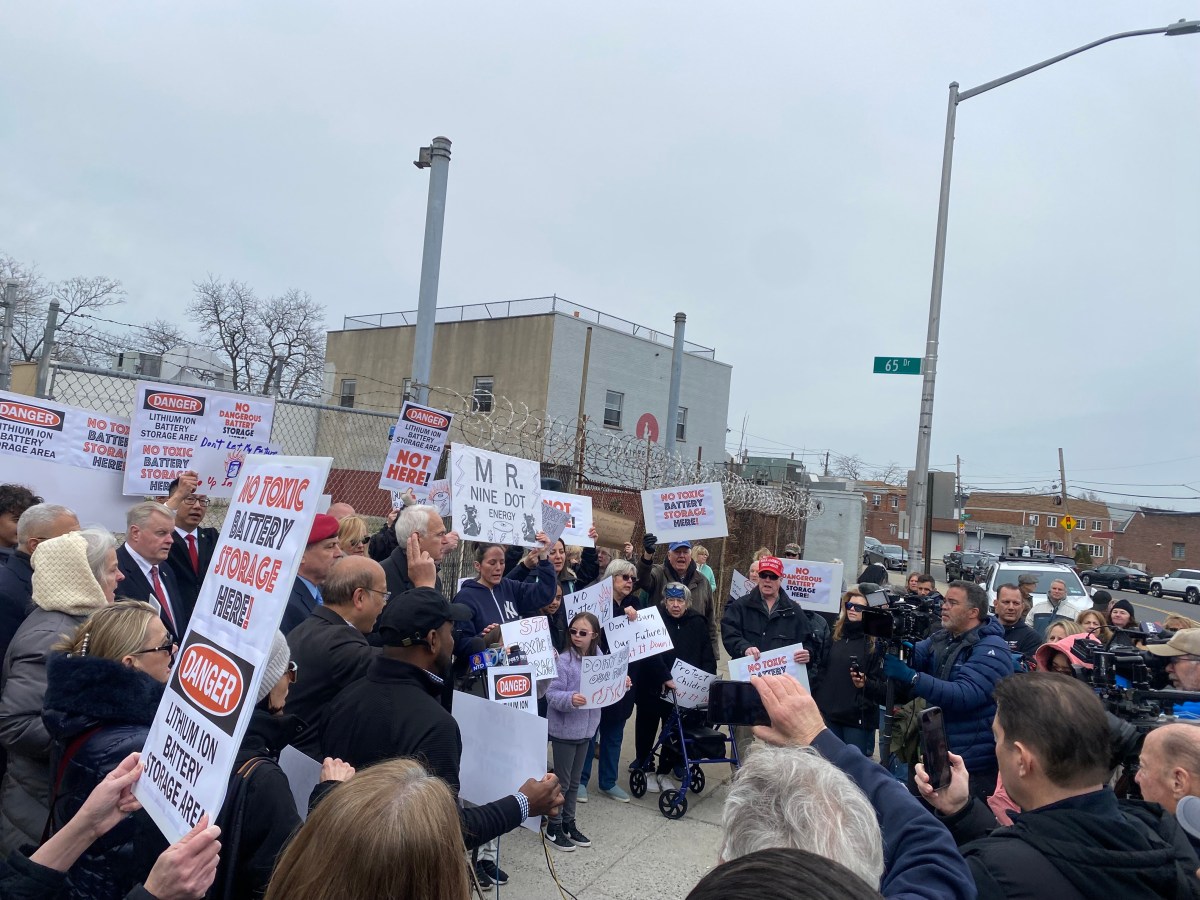A fleet of buses carrying migrants reached the Port Authority bus terminal from the Texas border over the weekend and amNewYork Metro followed the process from arrival to departure as volunteers strove to welcome them amidst, in their words, little help from the city.
After a first fleet of buses arrived last weekend, more migrants were relocated to the Big Apple on Friday, Aug. 12 and Sunday, Aug. 14. New York’s newest residents waved from the vehicles’ windows as they pulled into Eighth Avenue and 42nd Street. While they were excited to be finally ending a grueling journey, many of them were frightened, confused, and even ill with COVID-19.
The pilgrimage across the border had left them weary and yet, as soon as they stepped foot into the United States, families were torn apart — husbands and wives separated, forced to embark on another expedition across the country at the behest of Texas Governor Greg Abbott.
The Arrival
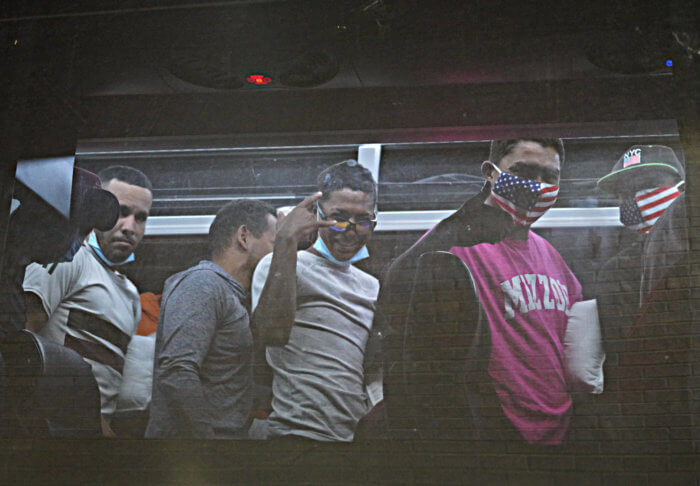
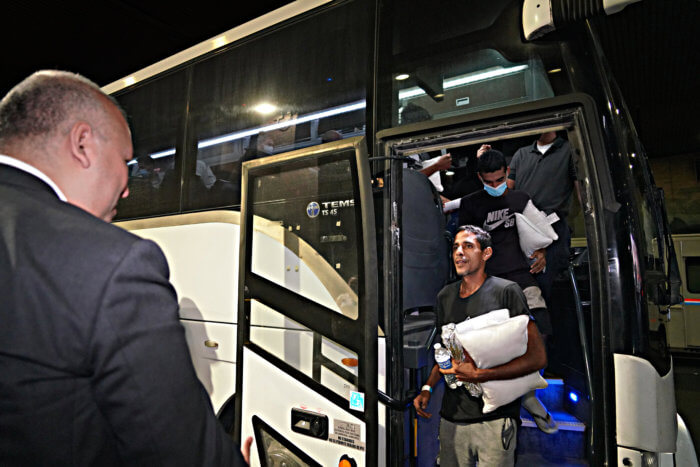
Passed around like political gambits between two opposing parties, the human cost is high and certainly felt by those who donated their time to greet the travelers. According to volunteers on the ground, this is a crisis, not due to the number of arrivals but, rather, a lack of substantial support from the city.
“[Mayor Eric Adams] showed up for a press conference last week and hasn’t been back since,” volunteer Yessenia Benitez charged. “The statements that he has given are just absurd. For him to welcome people inside the bus terminal, not knowing where the people are ending up, that allows for trafficking situations.”
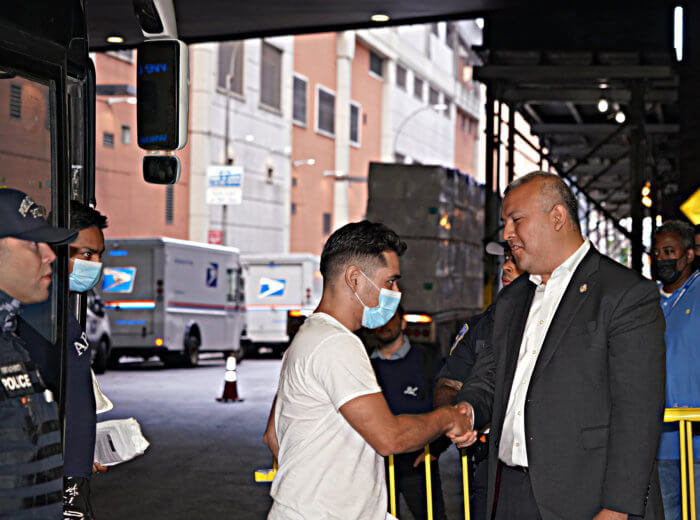
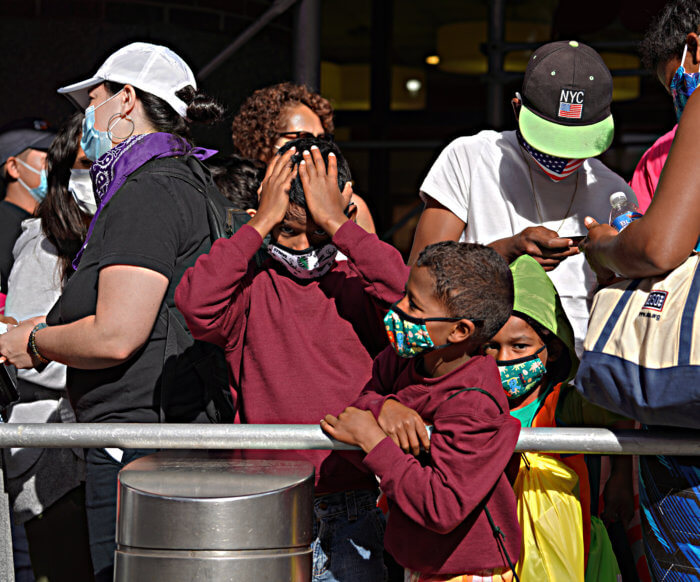
Despite a promised influx of city services for the migrants, many of the volunteers who have overseen their arrival say they themselves are helming the ship at Port Authority.
One by one, individuals hailing from Nicaragua, Venezuela, Cuba, and other Latin American countries exit the buses at the city’s sprawling transit hub, where they are met by the Mayor’s Office of Immigrant Affairs (MOIA) Commissioner Manuel Castro before being hurried inside the terminal. Hugging documents close to their chest and tags scrawled with their names dangling from their bags, for those experiencing it the scene was eerily reminiscent of WWII prisoners.
The Intake
Migrants arrived this weekend with very little to their name, some with no shoes or only flimsy flip flops. Most have come to seek asylum in the United States with simply the clothes on their backs.
“Clearly in Texas these families are not being provided with the support they need. They’re arriving in New York with medical conditions. They’re sick, they’re tired, they’re hungry,” Commissioner Castro told amNewYork Metro. “We have a lot of questions about the treatment that they’re experiencing. The world is noticing this, international human rights organizations are noticing this. What Texas is doing, what Governor Abbott is doing, is crossing the line.”
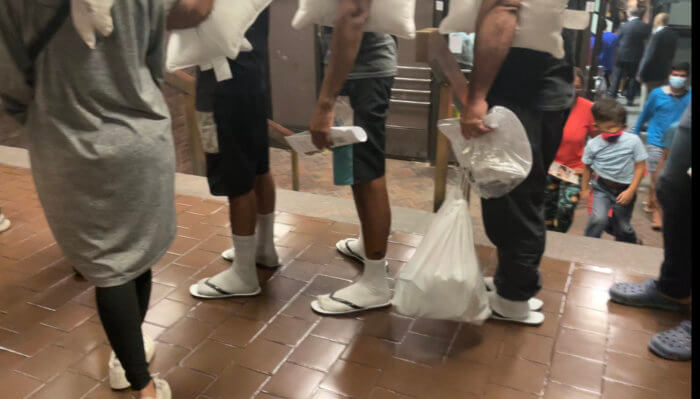
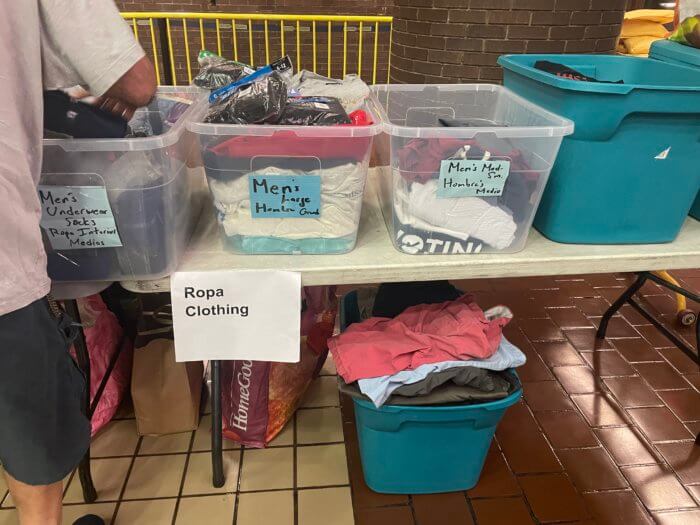
Inside Port Authority, volunteers brandished signs reading “Welcome to New York City” as they shouted out “Bienvenidos” and applauded — much to the surprise of the migrants. From there, the new New Yorkers were guided into a small, boxed section of the terminal that was cordoned-off with yellow barricades and guarded by police officers. A handful of tables manned by volunteers lined the area with food, coffee, clothing, and other basic necessities.
Although there are tables run by the New York Immigration Coalition, the Mayor’s Office of Immigration, and other citywide offices, the city’s nonprofits are leading the charge, with less than a handful of staff from the Adams administration overseeing this process.
When contacted for comment, the mayor’s office shared its appreciation for those organizations involved and their tireless effort and collaboration — among them, Grannies Respond Team TLC, Rethink Food, Hungry Monks, NYIC, and SOMOS Care.
Even so, according to information obtained by the mayor’s office, tensions between volunteer groups and city workers have been, at times, abrasive. A City Hall spokesperson argued that at least one mutual aid group — the South Bronx Mutual Aid Group — previously refused to coordinate with city workers, and allegedly hurled verbal abuse at staff while also refusing to follow Port Authority rules. The mayor’s office further stated that the group has refused multiple times to use the Ubers, secured by the city through a partnership with the ride-share app, to transport asylum seekers from Port Authority to the shelters.
South Bronx Mutual Aid Group did not immediately respond to a request for comment, but groups on the ground Sunday said they’re just looking to do what’s best for those arriving to the city.
Adams last week said that was also the city’s priority.
“Our role here in this city is to provide shelter, education, food services, all of those services that are important,” he said last Sunday. “This is what we’ve always done, and this is what we’re going to continue to do.”
A spokesperson for City Hall doubled down on this in a statement to amNewYork Metro on Aug. 14.
“Our priority is the safety of the arriving asylum seekers and everyone involved in these efforts. WE HAVE WORKED WITH THE PORT AUTHORITY to ENSURE NON PROFITS HAVE THE SPACE AND COORDINATION REQUIRED TO SERVE ASYLUM SEEKERS GETTING OFF BUSES. WE ARE INCREDIBLY GRATEFUL TO non profits, as well as community and volunteer groups for their partnership. We work collaboratively with community groups to provide food, water, and clothing,” the spokesperson wrote in an email. “The City also has secured on site medical and legal assistance, as well as [Personal Protective Equipment] and COVID-19 tests. In addition to what our city is already doing to support asylum seekers, we are awarding $6,750,000 in contracts to nonprofit organizations for case management and other critical services.”
With clipboards in hand, volunteers with Mutual Aid and Team TLC NYC this Sunday helped migrants fill out what they call an intake form, which consisted of inquiring their name, country of origin, phone number, and where they intend to travel from there. All of this information is kept confidential and used solely to ensure the safety of those migrating.
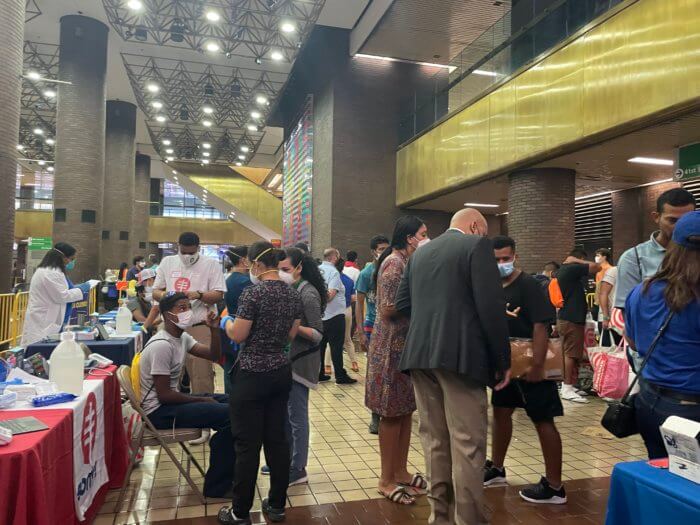
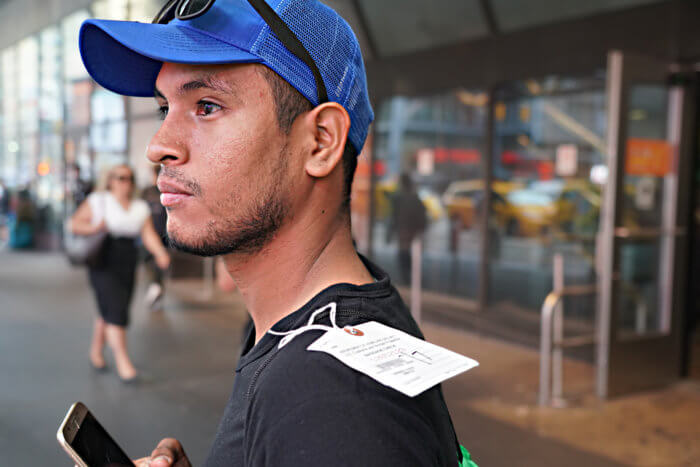
From this point, travelers are examined by SOMOS doctors who perform a COVID-19 rapid test, blood pressure check, and inquire if anyone is feeling ill. If someone is sick, EMS teams are on hand to render aid.
In many instances, migrants are arriving with swollen feet since most of them have walked from Latin America to Texas in an arduous trek. They are dehydrated, hungry, and apprehensive. One man sat on a steel chair, his leg anxiously bouncing up and down with uncertainty as a volunteer from SOMOS knelt down to provide him comfort, tears welling in his eyes.
Others shared that they were coerced to go onto the bus to New York City, even though they sought passage to other cities such as Chicago and Miami. Despite the confusion, volunteers remained steadfast, offering reassurance, refusing to leave their sides until they arrived in a safe location — yet according to those in the know, safe is a relative term.
The Departure
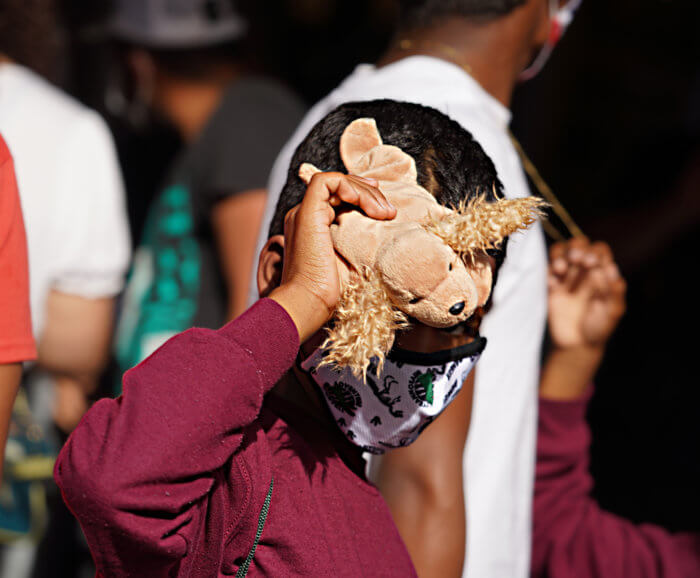
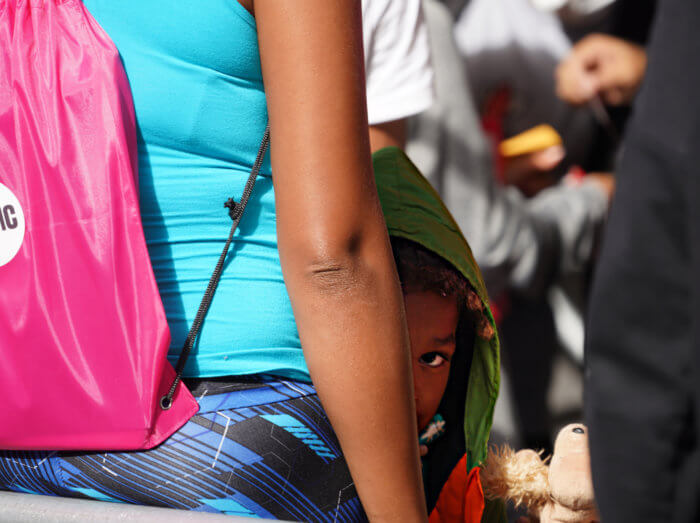
Families that remained together are then led to the street for transport, provided by Uber, where drivers are joined by volunteers who ensure that migrants are taken to their destination safely. A small number of volunteers also use their bikes to form a protective area as they wait for transportation, due to several hecklers hurling abusive and cruel remarks about their arrivals and press swarming them with cameras.
Those helping to facilitate further maintain that the shelter system these migrants are heading into is unprofessional, dangerous, and failing to provide those arriving with what they need.
“It’s horrible,” Benitez said, adding that some mutual aid group volunteers have even gone as far as to stay with the migrants until they get what they need — which is oftentimes as simple as a translator. “[Some are waiting] in the shelter for hours because the shelter is telling them that they cannot be serviced because they don’t have translation, which is something that the city should provide even within the shelter system. We know that this is not an issue only with migrating families, but as someone who has been working with undocumented and unhoused populations here [it’s an issue].”
The process is especially draining for volunteers who are refugees themselves. Some of those lending a helping hand have been through this process themselves and experienced similar trauma, which opens up old wounds. Even so, they say they would not have it any other way.
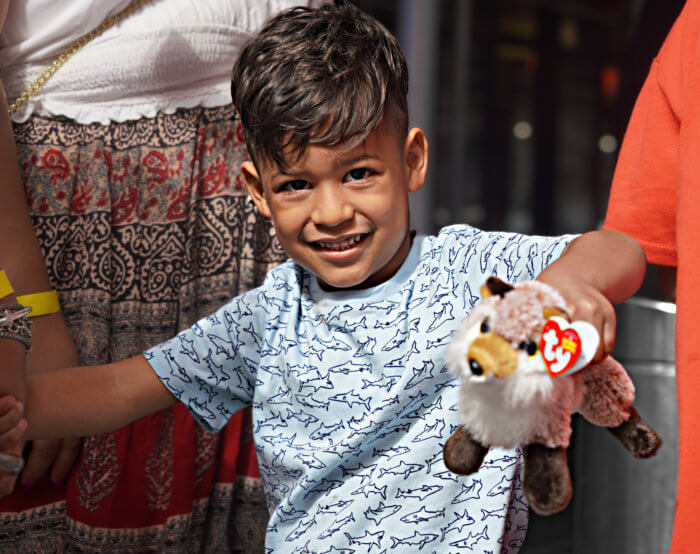
“As a refugee, this is very important because the system is not created for people like ourselves,” a volunteer named Adama told amNewYork Metro. “It’s important to help them navigate around it. They don’t qualify for public benefits. They don’t qualify for Medicaid and they don’t qualify for food stamps. So, these people rely on food pantries, free medical care.”
“It’s emotional and it’s needed,” Adama went on.
amNewYork Metro followed one group of men to the HRA Men’s Shelter on East 30th Street, where migrants were transferred from the warm embrace of volunteers to the very direct and strict greetings from city workers. Additionally, upon exiting a minibus in Murray Hill, migrants were shocked to see numerous individuals with mental health issues, and those under the influence of drugs yelling and behaving erratically as they entered the building.
The migrants were met with harsh attitudes from security, who denied volunteers entrance to the facility, preventing them from seeing the process through as they’ve done in other instances. The shelter’s staff assured volunteers that they were more than capable of registering the migrants, also noting that they have translators. And if someone does not stay, staff said, it’s due to their own dissatisfaction with the services.
For others who have family and friends in the city, it was an emotional welcoming from those who have already migrated to New York and cultivated a life in the United States.
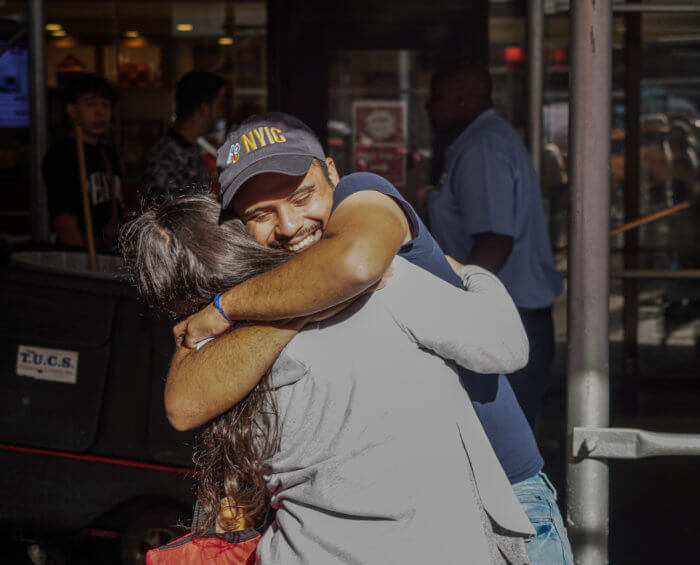
For others, volunteers served as that family waiting to welcome them to New York City.
Through the aid of a translator, a migrant told amNewYork Metro that he was thankful for the volunteer’s help and the supplies they provided. “They gave me water, medical attention and everything was very smooth,” he said. “I’m happy to be here.”



